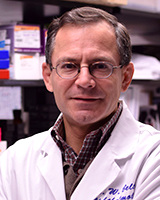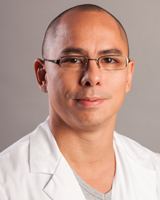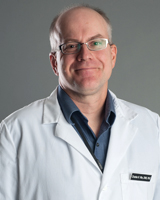[March 14, 2018; Philadelphia, PA] – Four faculty members at Penn Vet have been promoted to full professor in the Department of Clinical Sciences and Advanced Medicine: William A. Beltran, DVM, MSc, PhD; Margret L. Casal, DVM, Dr phil II, PhD; Wilfried Mai, Dr. Méd Vét, MSc, PhD; and Charles H. Vite, DVM, PhD.
“Dr. Beltran, Dr. Casal, Dr. Mai, and Dr. Vite espouse the highest standards of collegiality, clinical service, teaching acumen, and world-class research excellence in their respective fields,” said Oliver A. Garden, Henry and Corinne R. Bower Professor of Medicine and Chairman of the Department of Clinical Sciences and Advanced Medicine. “They have each carved amazing careers to date, with much still to come. Their caliber is impressive and they are critical to fulfilling our mission as a leader in both animal and human health.”
 Dr. William A. Beltran joined Penn Vet in 2006 as assistant professor of Ophthalmology, he was appointed associate professor of Ophthalmology in 2012, and in 2017 was named director of the Division of Experimental Retinal Therapies. His research focuses on inherited retinal degeneration, a major cause of blindness in dogs and humans worldwide. Specifically, he has investigated the signaling pathways affected by X-linked retinitis pigmentosa and autosomal dominant retinitis pigmentosa, two of the most common forms of inherited retinal degeneration in man. Working in canines, who suffer from forms of retinal degeneration that closely mimic the human diseases, he has helped develop effective gene therapies with promising results for treating both early-and late-stage disease. Beltran, who is a board-certified Diplomate of the European College of Veterinary Ophthalmologists, earned his veterinary degree at the University of Paris and Veterinary School of Maisons-Alfort, France, his MSc in biological and medical sciences at the University of Paris, and his PhD in comparative biomedical sciences from Cornell University.
Dr. William A. Beltran joined Penn Vet in 2006 as assistant professor of Ophthalmology, he was appointed associate professor of Ophthalmology in 2012, and in 2017 was named director of the Division of Experimental Retinal Therapies. His research focuses on inherited retinal degeneration, a major cause of blindness in dogs and humans worldwide. Specifically, he has investigated the signaling pathways affected by X-linked retinitis pigmentosa and autosomal dominant retinitis pigmentosa, two of the most common forms of inherited retinal degeneration in man. Working in canines, who suffer from forms of retinal degeneration that closely mimic the human diseases, he has helped develop effective gene therapies with promising results for treating both early-and late-stage disease. Beltran, who is a board-certified Diplomate of the European College of Veterinary Ophthalmologists, earned his veterinary degree at the University of Paris and Veterinary School of Maisons-Alfort, France, his MSc in biological and medical sciences at the University of Paris, and his PhD in comparative biomedical sciences from Cornell University.
 Dr. Margret L. Casal was a postdoctoral fellow at Penn Vet. She was appointed assistant professor of Medical Genetics, Reproduction, and Pediatrics in 1999, and appointed associate professor of Medical Genetics, Reproduction, and Pediatrics in 2009. Casal was named service head of Pediatrics, Genetics and Reproduction at Ryan Hospital in 2014. Recognized internationally as a small animal pediatric and clinical genetics specialist, her research focuses on the characterization of canine and feline models of human genetic disease, their molecular causes, and the development of novel treatments for diseases in animals and humans. Casal, who is a board-certified Diplomate of the European College of Animal Reproduction, earned her veterinary degree at the University of Zurich, Switzerland, her Dr phil II degree in virology and vaccinology at the University of Bern, Switzerland, and her PhD in pathology and gene therapy at the University of Pennsylvania.
Dr. Margret L. Casal was a postdoctoral fellow at Penn Vet. She was appointed assistant professor of Medical Genetics, Reproduction, and Pediatrics in 1999, and appointed associate professor of Medical Genetics, Reproduction, and Pediatrics in 2009. Casal was named service head of Pediatrics, Genetics and Reproduction at Ryan Hospital in 2014. Recognized internationally as a small animal pediatric and clinical genetics specialist, her research focuses on the characterization of canine and feline models of human genetic disease, their molecular causes, and the development of novel treatments for diseases in animals and humans. Casal, who is a board-certified Diplomate of the European College of Animal Reproduction, earned her veterinary degree at the University of Zurich, Switzerland, her Dr phil II degree in virology and vaccinology at the University of Bern, Switzerland, and her PhD in pathology and gene therapy at the University of Pennsylvania.
 Dr. Wilfried Mai joined the faculty at Penn Vet as a lecturer in Radiology. He was appointed assistant professor of Radiology in 2004, and associate professor of Radiology in 2011. In 2007, Mai was appointed section chief of Radiology. His research focuses on the clinical aspects of veterinary diagnostic imaging with an emphasis on vascular imaging and neuroimaging. Mai is a board-certified Diplomate of the American College of Veterinary Radiology and a board-certified Diplomate of the European College of Veterinary Diagnostic Imaging. He earned his veterinary degree at the Veterinary School of Maisons-Alfort, France, his MSc in biomedical engineering at the University Joseph Fourier of Grenoble, France, and his PhD in biomedical engineering and diagnostic imaging from the University Claude Bernard of Lyon, France and Duke University.
Dr. Wilfried Mai joined the faculty at Penn Vet as a lecturer in Radiology. He was appointed assistant professor of Radiology in 2004, and associate professor of Radiology in 2011. In 2007, Mai was appointed section chief of Radiology. His research focuses on the clinical aspects of veterinary diagnostic imaging with an emphasis on vascular imaging and neuroimaging. Mai is a board-certified Diplomate of the American College of Veterinary Radiology and a board-certified Diplomate of the European College of Veterinary Diagnostic Imaging. He earned his veterinary degree at the Veterinary School of Maisons-Alfort, France, his MSc in biomedical engineering at the University Joseph Fourier of Grenoble, France, and his PhD in biomedical engineering and diagnostic imaging from the University Claude Bernard of Lyon, France and Duke University.
 Dr. Charles H. Vite was a postdoctoral fellow in the Department of Pathobiology at Penn Vet. He was appointed assistant professor of Neurology in 2004, and associate professor of Neurology in 2012. Vite’s research focuses on diseases of the brain including epilepsy, as well as neurodegenerative and neurodevelopmental processes. In 2015, Vite became the director of the Referral Center for Animal Models of Human Genetic Disease and, in 2017, he was named head of the Division of Inherited Metabolic Diseases. He serves on numerous scientific advisory and editorial boards, and is past-president of Neurology in the American College of Veterinary Internal Medicine. Vite received the Zoetis Award for Veterinary Research Excellence in 2014; and on the teaching side, he has been recognized with two Veterinary Medical Student Organization Teaching Awards in 2005 and 2009. Vite earned is veterinary degree at Purdue University, and his PhD from the University of Pennsylvania.
Dr. Charles H. Vite was a postdoctoral fellow in the Department of Pathobiology at Penn Vet. He was appointed assistant professor of Neurology in 2004, and associate professor of Neurology in 2012. Vite’s research focuses on diseases of the brain including epilepsy, as well as neurodegenerative and neurodevelopmental processes. In 2015, Vite became the director of the Referral Center for Animal Models of Human Genetic Disease and, in 2017, he was named head of the Division of Inherited Metabolic Diseases. He serves on numerous scientific advisory and editorial boards, and is past-president of Neurology in the American College of Veterinary Internal Medicine. Vite received the Zoetis Award for Veterinary Research Excellence in 2014; and on the teaching side, he has been recognized with two Veterinary Medical Student Organization Teaching Awards in 2005 and 2009. Vite earned is veterinary degree at Purdue University, and his PhD from the University of Pennsylvania.
Information about their research, expertise, and publications can be found at the Penn Vet faculty directory.